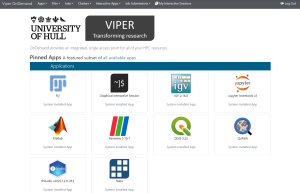The University introduced its first institutional High Performance Computing (HPC) facility in 2016, meeting a growing demand for advanced research computing capabilities. The Viper project delivered 5,500 compute cores, at the time making the University of Hull home to the most powerful institutional HPC facility in the North of England. Viper quickly became a critical part of the University’s research environment, used by researchers across the University.
In summer 2023, the University approved a project to procure a replacement HPC facility. It is likely that a new HPC system will come online in mid 2025.
In order to ensure the new facility meets the needs of the research community for the next five years, it is important for us to understand the HPC requirements of researchers across the University. You can have your say by filling out the form linked below.
Impact of Viper
Since 2016 hundreds of research staff, students and undergraduates from across all four faculties have made use of Viper, from traditional HPC fields such as Astrophysics, Engineering, AI and Deep Learning and Bioinformatics to more non-traditional fields like Health Science, Economics and Psychology. These users have run more than 4 million tasks, contributing to over 200 research publications and more then 45 postgraduate completions.
Making Use of Viper
While the traditional view of HPC may involve programming and running models or simulations over large numbers of computers, this isn’t the only way to benefit from such systems. You don’t need to be a computer scientist or programmer to make use of HPC, with many researchers using Viper to run familiar desktop tasks such as Python, RStudio, Stata, Matlab and Ansys, often with graphical interfaces, while benefiting from improved performance, more memory or the ability to run multiple tasks concurrently. Resources such as Viper can benefit many researchers with a computational element to their work.
Viper is now more accessible than ever thanks to Viper OnDemand, a web based portal allowing our users to access the computation resources of Viper from a browser at the click of a button!
Viper is supported by a dedicated team in IT Services who are able to help you get started and benefit from the resources available.
Looking to HPC-2
The intention of HPC-2 is to build on the success of Viper to further support the University of Hull research community. This includes increasing the capacity and capability, while making the facility accessible to both existing and new HPC users.
The growth of AI and Machine Learning in many research areas means we’ll be looking to build such capabilities with HPC-2 by increasing the GPU resource.
Large scale computing facilities like Viper and HPC-2 have significant power and cooling requirements. With the University’s carbon neutral 2027 target in mind, we will be looking at many ways we can make HPC-2 a really sustainable facility.
Getting Involved
You can have your say be completing the following survey at https://forms.office.com/e/gSZBHaygRF
We are looking to complete the requirements gathering exercise by March 28th, so make sure you take your chance to tell us about your computational requirements for the next five years by then!
If you would just like to talk to the Viper support team regarding anything about High Performance Computing at Hull, please email us at viper@hull.ac.uk


